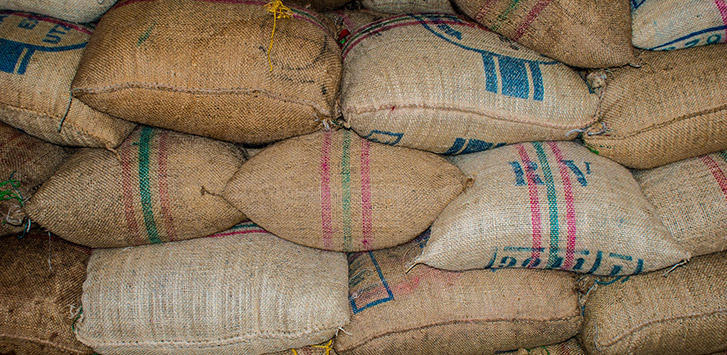
While other African countries may have started growing and cultivating coffee beans sooner, Kenya produces one of the most elite, specialty coffees in the world with some of the most authentic flavors and a famous winey-acidity known the world over by coffee lovers. However, Kenya is not only famous for its coffee, but it is also famous for its cooperative system of production and perfect coffee growing regions.
Kenyan Coffee Production
Over the decades, Kenya’s implemented a cooperative system of production, processing, milling, and marketing. Unlike many other coffee-making countries, 70% of Kenya’s coffee production is run by small scale farmers.
All single origin Kenyan green coffee beans undergo wet processing to pull out the berry and citrus flavors and create a cleaner, brighter, fruitier cup of coffee. After being washed, the beans are fermented for up to 36 hours to remove the slimy, sugary coating. Then, they are sun-dried and move on to the milling phase, where the fruit is removed from the dry husk.
After milling, Kenyan coffee beans are graded. Grades are assigned based on their size, weight, shape, and color. The beans can be labeled anywhere from E (for elephant) to AA to C (one of the smallest sizes). The larger, thicker, healthier, and denser the bean is, the better flavor it has.
Currently, Kenyan coffee production is one of the most advanced in the world as it works off a cooperative system. Research facilities back the coffee production and look towards the future, as they try to invent coffee beans that can withstand disease.

During the harvest season, an open auction export takes place every Tuesday to create a price war, keeping the coffee market alive. This is a decades-old tradition, going back for generations. The small-scale farmers often end up selling the beans to larger buyers or processing stations, which sort the beans and then sell them to others.
Growing Regions
Kenya has the perfect growing conditions for coffee beans. To grow a good coffee bean, elevation, rainfall, sun exposure, and soil quality all play a role.
Many of Kenya’s coffee beans are grown on high plateaus between 4,500 to 6,500 feet above sea level, such as Mt. Kenya, the Aberdare Range, and Kisii. The high altitudes have harsher growing conditions, which force the coffee plants to fight to survive, creating more nutrients.

The more nutrients in a coffee plant, the more acidic and flavorful the ensuing coffee is. Since the coffee beans are grown in such high altitudes, they qualify for Strictly High Grown (SHG)/Strictly Hard Bean (SHB).
Since Kenya is close to the equator, the coffee plants experience a steady amount of sunshine. In some places, where there is a lack of shade, the beans carry even more of the characteristic brightness for which Kenyan coffee beans are famous. Meanwhile, the temperature fluctuates between warm and cold in the mountainous regions, encouraging rainfall.
Much of Kenya’s growing regions are located on volcanic soil, which is rich with vitamins and minerals that help the coffee plants grow and nurture its nutrients. This, in turn, enhances the coffee beans’ nuanced flavors.
All of these natural growth factors help Kenya provide a consistent, premium gourmet coffee.
Flavor Profiles
Kenyan coffee beans are known for their intense flavor, full-body, and a pleasant aroma. While each growing region produces a slightly different blend of citrus notes and tropical taste, the overarching theme is a balanced complexity with a deep dimension.
The coffee has a savory-sweet nuance that is pitted against the wine-like acidity, due to the high altitudes and volcanic soil. Bold flavors lace each cup with tones ranging from black currant berries to tart citrus. The aftertaste often suggests a winey flavor or lemony zest. The wet processing creates a vibrant, clean, crisp cup that is rich with flavor and vividly complex fruity notes.
Kenya produces arabica coffee beans that are high in quality and are often known as the “Connoisseurs Cup”.
Culture
Coffee beans were not cultivated in Kenya until the 1890s when a group of French missionaries, called the Holy Ghost Fathers, arrived in Kenya from an island off the coast. The mission farms that they settled became the nucleus of Kenyan coffee growing for decades. Now, coffee growing has spread throughout the country and is mostly lead by groups of small-scale farmers.
Ironically, most Kenyans prefer to drink tea rather than coffee. When they do drink coffee, though, they prepare the traditional drink called “Kahawa Chunghu” or “Bitter Coffee”. It’s a spicy, black coffee that’s brewed at home or in the marketplace.
The bitter coffee is brewed in a brass kettle over a charcoal stove. Spices, like ginger, cardamom, and cinnamon, are often thrown in the kettle to brew with the coffee, making it bitter. The coffee is served in miniature cups with dates or other sweet treats on the side. In some locations, they brew “Kahaw Tamu”, which is sweeter in taste and lighter in color than the typical “Kahawa Chunghu”.
Brewing Styles
Since Kenyan coffee beans are highly acidic, the best brewing method to use is a steeping method to fully pull out all of the nuanced flavors while not overwhelming your coffee with acidity. If you want to make Kenyan coffee at home, you could use a French press, Aeropress, or cold brew.
These methods preserve the subtle floral and fruity flavors of the beans, which are what make the coffee so delicious. If you want to highlight the bright acidity of the coffee, brew stronger and grind finer than you normally would for these brewing methods.
Conclusion
Kenya produces some of the best coffee in the world. It’s known for its cooperative system that promotes coffee bean production and selling. Most importantly, though, this African coffee is known for growing coffee beans that make a clean, crisp, vibrant, and complex cup of coffee.